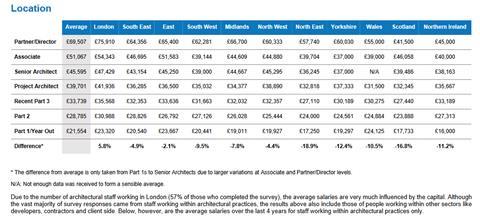Practices pay salary premiums for staff with prized digital experience

Architects with the most desirable digital skills can command a premium of as much as 9% when it comes to negotiating salaries, according to new research.
Practices looking to embrace technology are increasingly prepared to stump up cash to attract staff with BIM and Revit skills in particular, they told specialist recruitment firm 9B Careers.
The agency publishes an annual architectural salary survey which this year found that average pay had declined by around 0.8% compared to 2018.
With inflation currently at 1.7%, architectural salaries were “falling a long way behind”, said Paul Chappell, a director at 9B Careers.
”The salaries for senior architects and directors have had significant drops this year which I imagine is mainly Brexit related,” he said, adding that pay for middle-ranking staff was “stagnating”.
The exception was for people with the most sought-after skills. Chappell said: “The most notable change in 2019 has been the surge in demand for more technical staff. BIM coordinators have seen their rates increase by an average of 9% and architectural technicians and technologists have increased by around 6.7%.”
This appeared to be driven by a skills shortage in these areas, he said.
The salaries of part I and II architects bore up quite well, according to the survey. “I’m just speculating but I imagine this is partly due to fewer EU architectural staff coming to the UK now and also that people are getting into Revit earlier,” he said.
“As more and more practices transition to BIM, it appears there is a shortage of knowledge in this area and we are often finding the skills of architectural technicians and technologists are well suited to fill this gap,” he added.
“Invariably anyone who has strong experience of BIM is being paid a premium by practices looking to improve their knowledge base.
Speaking to BD last month Phil Southgate, managing director of Gleeds’ building surveying division, said it was not only small firms struggling to use BIM on projects.
He said: “Even big architectural practices are struggling with the level of expertise they have – we as an industry end up taking shortcuts.”
He also said clients were “often not intelligent enough to know what’s missing” and were therefore unable to question the decision not to implement BIM on a project.
>> Read more: Government relaxes architect visa requirements
>> Read more: Pay is not the only area of discrimination we should be judging practices on
The survey also showed that while the pay gap between male and female staff is narrowing at the beginning of careers - with women generally being paid the same as their male counterparts for the first five years - their remains a significant gap at the top, with female staff with 21+ years’ experience earning around £4,000 less. Women are also far less likely to receive a bonus than their male counterparts, the responses showed.
Chappell also had a cautionary word for architectural staff looking for significant increases in pay.
“These opportunities are predominantly found away from traditional architectural practice,” he said.
“Although this can appear to be an easy option, these positions - with developers or client side for retail or hotel chains - tend to be a move into more project management roles and demand a lot of specific sector experience. The roles also tend to involve taking on more responsibility but without the support network often found within an architectural office.”

















20 Readers' comments